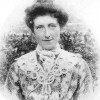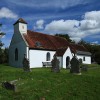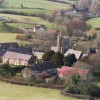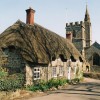The 2nd of June 1990 dawned as a day of great moment for the people of Dorchester. The county town was festooned with bunting, and there was a carnival atmosphere, for that week Dorchester and its county were observing and celebrating the 150th anniversary of the birth of Dorset’s greatest son in the world of words: Thomas Hardy.
It is not the intention here to present yet another potted chronological discourse on Hardy’s life and works. For that one can refer to any one of about a dozen exhaustive biographies currently in print. Instead, this is a speculative account of how the great man would find his patch of native soil today, and to contrast his Dorset with today’s Dorset. Were Hardy to come back today, would he soon need counselling for culture shock? This is perhaps more than just idle speculation, because as elsewhere so much has changed in society, economics, the environment and infrastructure since the innocent carefree days of the 1920’s when a bed-ridden Hardy took his last breath during a stormy January night.
Hardy’s birth-cottage at Bockhampton has of course been pickled in aspic for posterity, but Max Gate, the home he later built for himself near Dorchester, had a virgin beginning. When the author first moved into the rather oppressive redbrick house in the latter 19th century it stood almost in the middle of nowhere, a new dwelling place on a blank field. The fringe of Dorchester then maintained a respectable distance, but the march of time has put paid to Max Gate’s isolation. Today the house, now in the care of the National Trust, became hemmed in some 30 years ago by an estate of modern housing. Not far to the north the green belt country which once separated the author from his county town has since been torn asunder by the course of the town’s southern bypass.
Max Gate was soon besieged by admirers collecting souvenirs from the garden or hoping to catch a glimpse of the author at work. To ensure his privacy, one of the first things Hardy did at his self-styled home was to plant saplings out in the front, one of which he had tenderly reared in a pot on his windowsill while he was living at Wimborne. By the night he died they were noble in-closing trees darkening the rooms, but which waved their branches in farewell in the January gale when the old man died.
The author of ‘Under the Greenwood Tree’ would at least be pleased to see that the Max Gate trees have of course been protected and preserved, but over the years many other trees and hedgerows countywide would have succumbed to disease, neglect, vandalism or development. The manageable farm holdings of Hardy’s day have fallen prey to the post-war industrialisation of arable agriculture, with its powered machinery such as combine harvesters and suction milking machines, laying off milkmaids from milking sheds and the many who once harvested the crops with scythes and slaked their thirst with cider swigged from stoneware flagons brought onto the field. They were the agrarians who needed no pesticides, herbicides or artificial fertilisers; they would never know the meaning of BSE, CJD, Scarpie, Wine Lakes, Butter Mountains or paperwork from Brussels.
From Max Gate, Hardy could look towards his ancestral parish of Stinsford. It was here in St. Michael’s Church that his parents met and fell in love while playing together in the Church band. Thomas Hardy Sr. was a fine violinist, an instrument his famous son also took up when he too joined the family band. At that time St. Michael’s had high-backed pews and a minstrel’s gallery where the band played during the services. The gallery has long since been removed to accommodate the organ and the pews too, have been replaced by single seats. (Note: New gallery and organ installed in 1996 – see Parish Church article.)
At the time of Hardy’s death there were still some communities in the remoter parts of the county without electricity. Electrification did not come to Whitchurch Canonicorum in the Marshwood Vale, for instance, until the 1920’s. Today every village, if not every home can tap into the national grid, so releasing its share of CO2 to the global warming debate. In the days of Hardy’s youth such energy profligacy would not have been possible, and the highly efficient insulating effect of thatching would have made the typical Dorset cottage of the early 19th century a very low emission home!
Furthermore, it would have been (almost) zero-emission in waste. Those were the days when dustbins were for dust – or the cinders raked from the previous night’s fire. Vegetable peelings from the kitchen would likely have paled into insignificance the number of food containers left over from the simple purchases at the village corner shop. And if Hardy were alive today he would surely look back with nostalgia on the days when so much more food was produced and consumed locally.
But even living in his own time the author could never have imagined or even dreamed that within 60 years of his death people would be forced to travel several miles by bus or car to shop at an out-of-town multi-national hypermarket taking up the space of two football pitches. Similarly that he would witness a rash of takeaways blighting the green urban fringes to dish out fast meals of convenience, or a countryside blighted by power pylons, phone masts, vulgar advertising hoardings or distracting road signs. Besides the visual pollution the author would have been shocked by the elevated decibels of noise as well.
Another great change, this time in the landscape of the county, which would likely have appalled the writer was the commercial afforrestation of the heaths. Hardy had long been captivated by the mystic, enchanted atmosphere of his Egdon Heath at dawn and dusk. So much so that he once invited the Cheltenham-born composer Gustav Holst to visit and get a feel for the heath with the intention of capturing its essence in a composition. Back at work in Gloucestershire Holst’s score became his popular orchestral tone-poem ‘Egdon Heath.’ This heath retains something of its primordial atmosphere today; sadly though, the economic imperative of needing to replace timber stocks after the First World War became paramount, and other heath land was to disappear under conifer plantation managed by the Forestry Commission within the last decade of Hardy’s life.
Compared with Hardy’s day it might be thought that today’s Dorset is a place more selfish, uncaring and destitute of moral rectitude. Certainly during the late 19th century a remarkable evangelical revival was underway, turning people’s thoughts back to the wise council of the scriptures as a guide in their daily lives. The reward for this observance was a prosperity that grew and blossomed in a climate of public order and deference to authority. Yet Hardy’s later friend and fellow county-man, Newman Flower, could write in ‘Just as it Happened’ that as late as the 1890’s people were being thrown into Poole Harbour at election time, gamekeepers were being shot at in woods, and horsemen were being ambushed by robbers “of Dick Turpin order” on the highways.
It would however, not entirely be correct to think that the comparison between the Dorset Hardy knew and the Dorset as we know it concerns two distinct sets of conditions with no margin for overlap. From what has gone before, a definite conclusion emerges. It is that the socio-economic changes which have culminated in the “shock of the new” making the England of the 1990’s and now the 21st century what it is had already begun in Hardy’s lifetime. This is because he could bear witness to the negative effects of the aftermath of the Great War, which began to appear incrementally in society in the decade following the armistice. And it did not stop at the decline of morals and the advance of electrification, petrol-driven vehicles and telecommunications. Hardy still lived to see the first five years of radio broadcasting and even the first lowly beginning of television transmission.
But overall technology was still at a comparatively primitive level in Victorian England, and hi-tech was virtually unknown. Bearing this in mind it may come as no surprise to some that it was only gradually that Hardy overcame an inherent predisposition to technophobia. He balked at the new technology and revolution in travel brought about by motor cars when they arrived, declaring that legs were in our gift for walking on, not to wrap up in a fur to operate pedals! Even the telephone became an object of suspicion. Years went by before he used the telephone installed at Max Gate, and only then was his resistance broken when a lifelong friend rang “Dorchester 43” one day and insisted on speaking to him personally. Once this rubicon was crossed, however, he was ever after faithful to the invention.
In conclusion it is perhaps best to say that, on balance, the changes in Dorset over the past 170 years have been an inevitable double-edged sword of the bad and the good, of both progressive and retrograde steps.



